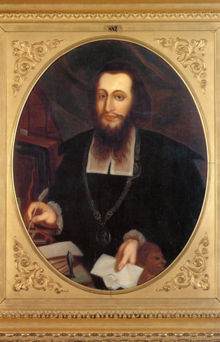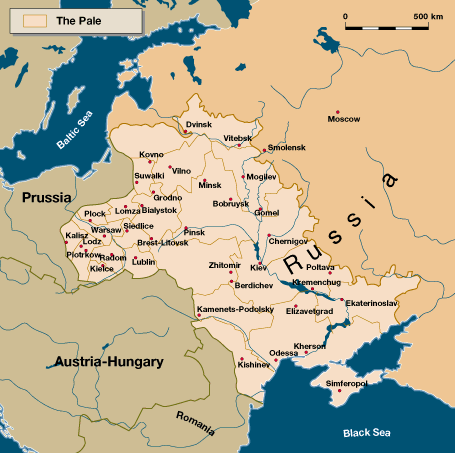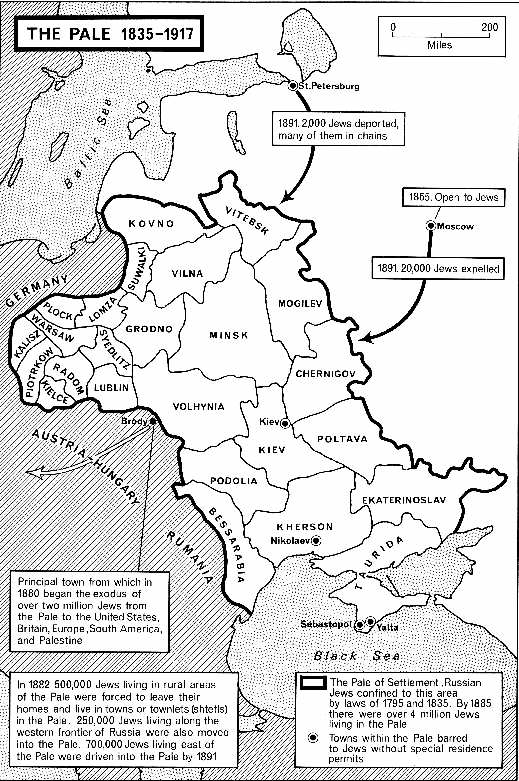
This explanation was taken from Origins of Jewish Last Names in Turov, by Leonid Smilovitsky, PhD, The Goldstein-Goren Diaspora Research Center of Tel Aviv University.
Read this article in Russian, on Происхождение еврейских фамилий в Турове.
The origins of Jewish last names provides a wealth of enlightening information. The linguistic origins of Jewish last names are primarily of German, Yiddish, Hebrew, Polish, Russian, and Беларусь Belarussian origin. Last names convey the professions and occupations of Jews, show the geography of Jewish migration, illustrate their relationships to the regions they resided in, and their interaction with neighbors and the surrounding world.
Most Jews received their permanent last names in a manner similar to the Jews in the Russian empire approximately 150-200 years ago.
From the end of the 18th century to the first half of the 19th century, inherited last names of Jews in Russia, Austro-Hungary and German states, did not exist. Every individual had only their own first name, to which the father's name may have been added in official documents. In addition, last names confirmed the birthplace of a person and the name of their mother or spouse. The surname existed for only one generation and was not passed on to the next. In the next generation, the name of the parents (or wife), the place of birth, and occupational sphere changed. This change was reflected in the person's last name or surname. For example, when Yitzhak Ben Yaacov had a son Moshe, the son was identified as Moshe Ben Yitzhak (Moshe, son of Yitzhak) in official documents, while Yitzhak's grandson (Moshe's son) became Leizer Ben Moshe. The household use of that same name may have been different: Moshe Brohes (Moshe, Broha's husband) or Leib Nehamkes (Leib, Nehama's son). The history of surname creation contains evidence of wars and territorial disputes between Poland and Russia. These brutal conflicts occurred on the territory of Беларусь Belarus in the 17th-18th centuries and substantially influenced the migration of Jewish inhabitants and determined the process of community formation.
In the mid 19th century Russian authorities launched an effort to assign heritable last names to Jews. This was an extension of a practice started by Austro-Hungary in 1797 and the German government in 1807-1834. The practice was prolonged over many years, yet still, in the 20th century, one could encounter Jews without last names. Last names were used in business transactions, registration of legal documents, non-Jewish legal proceedings, commercial receipts, etc. The most important use of last names, however, was for financial affairs. Jewish entrepreneurs and petty bourgeois suffered from excessive taxes, many of which were of an arbitrary nature. Having been forced to adapt to this, Jews often took advantage of the absence of permanent last names, passed on from generation to generation, and in this manner evaded inordinate tax burdens.
Russian officials, who were assigned the task of "naming" Jews, had to solve a complex problem. The last names had to reflect an ethnic association and hold meaning (denote something). To resolve this, the authorities approached the issue in their own way. First they employed simple German words, often close to or coinciding with Yiddish, as the foundation and used them to construct last names. These words referred to color or parts of the surrounding environment. This practice resulted in the following word elements: feld (field), wald (forest), gras (grass), baum (tree), berg (mountain), tsvaig (branch), blatt (leaf), stein (rock), rot (red), grun (green), gelb (yellow), blau (bleu), rosen (pink), gimmel (sky), braun (brown), vais (white), kirshen (cherry), tseder (cedar), tmin (caraway), etc. In this way, the majority of Jewish last names originated from a German background. In Тураў Turov or Turaŭ, these included Brombergs, Ginsburgs, Vaynblats, Rosenberg, Etingers, and others.

Jews did not wish to completely abide by rules of the German language and strove to preserve Yiddish. As a result, German last names soon started to sound the way the Jewish native language demanded. In Turov that meant Mendelbaum, not Mandelbaum as it sounds in German; Perkin, not Berkin; Kirzner, not Kirzhner; Lamdin, not Lamden; Laihtman, not Leihtman; Maklin, not Makler; Frenkel, not Frank; Shneiderman, not Shnaiderman; Shtelman, not Shtein; Etinger, not Ottinger, etc. On the other hand, the development of Jewish last names was influenced by Byelorussian borrowings, i.e. suffixes, and rules of word formation. That is how from the name Cohen we get Kogan, Kagan, Kaganovsky, Kaganovich, etc. Because of the haste with which officials strove to resolve the problem, a semantic incongruity arose. Only Jews had last names such as Beyntsenbaum, which in its translation from the German means "wheat tree"; Zauershtrom, "sour stream"; Levenfish, "fish-lion"; Siegenbaum, "goat tree"; Kvechman, "to speak out reluctantly"; Shuhman, "chock", "shoe", or "horseshoe."
Often Russian officials in Беларусь Belarus followed the German example of using the ending "er", which is typical of German or Yiddish.7 In this way, Gliners, Pinskers, Gummers, Kagners, Kelers, Kirzners, Reyders, Farbers, and Etingers appeared in Turov. With the passing of time, some of these last names were Russified, their ending ("er") was changed to "ski," a sound more comfortable to the Byelorussian and Russian ear. With that, Pinsker became Pinski, Minsker - Minski, Gliner - Glinski, and Vigorski, Gorodetski, Gorivodski, Drozdinski, Kabinetski, Chrapunski, and Chernitski appeared.
Old principles of forming Jewish family names also became a source of many last names, now permanent and passed on by inheritance. The Hebrew names בן Ben or בר Bar became "son" ("zon") (der Sohn - son in German). From here appeared Katz - Katznelson, Shmuel - Shmulenson, Abram - Abramson, Israelson, Davidson, and Gurshenzon. A different group of last names, belonging to this type, was closer to Yiddish than German. At the end of this type of last name is the word "man" (der Mann - person in German), but the first element of these last names was expressed in Yiddish. In Тураў Turov or Turaŭ, these last names were Ayzenman, Gizunterman, Gitelman, Glozman, Gozman, Goberman, Zingman, Kayterman, Klugerman, Koyfman, Krugman, Lieberman, Raichman, Fleightman, Shleyzman, etc. The ending "man" went well with many other prefixes, borrowed from simple meanings, such as gold (gold); silver, (zilber); copper (Kupfer - German; kuper, Yiddish); and money (Gelt).
The tradition (typical of a reserved feudal society) of classifying a person by his profession was not forgotten. However, now this tradition was passed on to descendants, regardless of their actual occupation and even when the ending "man" was not applied: Kushner, (furrier, furdresser); Papernik, (manufacturer of regular paper); Gefter, (manufacturer of notebooks); Treyger, (carrier); Shenker, (tractor driver); Botvinnik ("botsvina"- vegetable greenery, Polish); Kramnik - bench maker; Mashtaler - horseman; Shpitalnik - sanitarian; Tsukornik - pastry vendor. In Turov, the following were associated with these last names: Glozman (person who works with glass), Shifman (boatman), Shpeizman (cook, chef), Shusterman (shoemaker), Kirzner (furrier), Meklin (middle-man, broker), Offengendin (merchant of household birds), Farber (painter), Furman (carrier), Funtsman (one that weighs), Shlyapintoch (hat), etc.
The practice of allotting people last names according to their professional activities was widely prevalent in the Jewish Diaspora. Widespread Jewish trades, such as the shoemaking business resulted in the emergence of the following last names: Sandler (Hebrew), Shuster or Shister (Yiddish), Chebotaru (Romanian), Varga (Hungarian), and finally, Sapoznik or Sapoznikov (in Russian - meaning shoe or boot maker). Another, no less prevalent, occupation in the shtetl gave rise to the following last names: Portnoy, Portnov (Russian- tailor), Kravetz (Russian), Kravchuk (Byelorussian), Kravzov (Ukrainian), Hait (Yiddish), and Haiyat (Hebrew). Accordingly, the following last names appeared from the same root: Shnayder (Yiddish)- tailor, Shnayderman - person associated with tailoring, Shayderovski, etc. In Тураў Turov or Turaŭ, the tailoring trade was passed on by inheritance for a long time in the Shneyderman, Shvets and Tkach families.

Certain last names reflected a more narrow specialization: Peltser (one who sews leathers), Futerman (sews coats), Tandetnik, Altauzen (one who turns articles of clothing). Later came last names derived from instruments and devices used by tailors: Sher (scissors), and its derivatives - Sherman, Shermanzon; Nodl (needle) - Nodelman, Nudel, Nudelman (Ukrainian variation), Igolnik, Igolnikov (Russian); Press (iron) - Presman, Presser; Fodim (thread) - Fodimman; Knop (button) - Knopman, Knepel. A particularly large number of last names were associated with carpentry, painting, boat making, and carrier professions.
Last names aid in drawing the picture of Jewish occupations in Тураў Turov or Turaŭ: Aybinder (bookbinder), Ayzinman (auzn - metal, Yiddish) - metal worker, Vareg (vag - scale Yiddish) - someone associated with weighing, Portman (Port, German) - a person from a pier or boatman, Rapoport (reife - physician, mi port, Hebrew) - doctor from a port city, Fishman (fish, Yiddish) - fisherman or fish dealer, Hinchik (method of measuring land use, Беларусь Belarussian) - landsurveyor, Furman (fura, waggon, Yiddish) - carrier. There were also last names in Turov that sounded alike, but held different meaning: Leytman (leytn, Yiddish, to solder) and Lihtman (Licht, German) - light; or Lauthman (laut, Yiddish) - wealthy, respectable; and Laykhtman (laykht, Yiddish, light-noun) - light [adj]. Soshkin - derived from the female name Sora (Sarah) and Soshnik - emigrant from Soshnik village Pinsk uezd of the Minsk guberniya; Shtilman (shtil, Yiddish) - quiet, calm and Shtelman (steyn - rock, Yiddish) - one who works with stones. Some last names were so expressive that they speak for themselves: Bondar, Bondarev, Kuznetz, Kuznetzov, Pilshchik - carpenter, Muchnik - (muka, Russian, flour) - flour merchant, Molochnik (moloko, Russian, milk) - milk merchant, Krasilshchikov (kraska, Russian, paint) - painter, Grenader - soldier, Garbar (Беларусь Belarussian) - tanner. On the other hand, other last names require an explanation: Jewish men by the last name Zheleznyak (zhelezo, Russian, iron) received their last names because they were associated with the sale of metal (hardware), but were not blacksmiths, as it may seem at first glance.
A particular category of last names was one in which the prefix was given to occupations, ascribed only to Jews: Melamed (teacher in an heder), Soifer (one who reproduces sacred texts, Torah), Rabin, Rabinovich (rabbi), etc. These served as a basis for an entire line of last names associated with the observance of Jewish tradition, which set a rhythm to shtetl life and explained various difficult questions which arose in everyday endeavors and interactions. Before 1917, every Jew in Тураў Turov or Turaŭ, without exception, attended synagogues and minions, underwent a circumcision, was married under a chupah, observed kashrut and Shabbat, and buried their relatives at the Jewish cemetery. As a result of this, there existed an exceptional respect for people who were responsible for spiritual life that found its reflection in last names. In Тураў Turov or Turaŭ lived the Kantors, Kantarovichs, Kogans, Hazans, Hazanovichs - those who sang cantors in a synagogue; Lamdins and Lamdmans - those who studied the Torah (Lamdan - to study, Yiddish), Rabinovichs - descendants or members of the rabbi's family (רב rabin rabbi), RaShaP - an abbreviation for a well-known expert of Judaism Rabbi Shlomo Pinsker (Rabbi Solomon from Pinsk), Shulmans (שול shul), habitue of the synagogue and active believer, Yudanovichs (Yuda, Yehuda, Jew, Yiddish) - a self-given name for Jews. The last names Shamis, Shames, (שמש shamash) indicated that their ancestors were attendants at a synagogue. Reznik, Reznikov, Shoyhet, Sheyhatovich - were specialists in the ritual of butchering cattle and poultry; Menakers inherited their last name from being specialists in clearing fat, bruising of tendons, and other forbidden material in meat; Bodek - inspected the quality of meat, whereas the last name Shub symbolized the abbreviation, which combined 2 professions, named above, associated with the observation of the kashrut traditions: "shoyhet" and "u-bodek".
Last names often indicated the place certain families originated. A number of them kept their old German last names, which verified that their distant ancestors were emigrants from Germany. The Brombergs, Ginsburgs, Landaus and Landins lived in Тураў Turov or Turaŭ for a long time. Their ancestors apparently came from Landau or Landau in der Pfalz and Bavaria (Etinger - Ottingen Oettingen in Bayern). The Liphshits and Livshits were from Czech, Poland and Germany, Bohemia, Silesia, and Turing (Liebeschitz, Lobshutz, Liebschutz), while the Blochs came from Italy (w loch means Italian in Polish). In addition to these last names, Тураў Turov or Turaŭ had representatives of Russian, Ukrainian, and Lithuanian cities and shtetls. These included the Lutski, Kocherovski, and Hochinski families from the villages of Luka, Kocherovo and Hochin in the Житомир Zhytomyr guberniya; the Brailovskis from the city of Brailov, Vinnitsa uezd; and the Shleizmans from Shliozhi village of the Telshai uezd in Lithuania.
A large number of last names was derived from feminine and masculine given names. According to the accounts of linguist and historian Abraham Pribluda (Avrom-Shlema Mendelevich), a total number of 1758 Ashkenazi Jews had such last names, 1065 were masculine names and 693 were feminine. At the same time, 1622 last names originated from professions, trades, and other occupations.11 The person with the greatest influence in the family had the advantage. If the family depended on the husband as the primary source of income, or if the husband possessed some kind of obviously exceptional attribute, then the children received a last name derived from the male name - Haimovich, Abramovich, Yankelevich, etc. Boruchovs (Boruch), Morduchovs (Morduch), Levins (Levi), Slavkins (Slava), and others were the famous last names in Тураў Turov or Turaŭ.
Last names derived from female names had their own explanations. Men often left the home to earn money and during the time of their prolonged absences children were named after the mothers. This is how last names such as Haykin, Ryvkin, Sorkin, Estherkin, Leykin, Shifrin, Raykin, Malkin, etc. occur. In Тураў Turov or Turaŭ, this group of last names included the Gitelmans (Gita), Dvorkins (Dvoyra), Itkins (Ita), Kunda, Rashkins (Rohl, Rahel), Rivlins and Rishkins (Rivka), Soshkins (Sora, Sarah), and several others.
 Send e-mail to:
Send e-mail to: